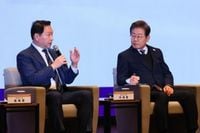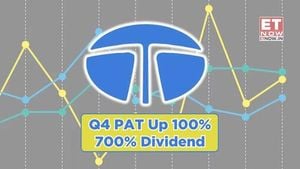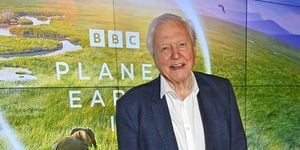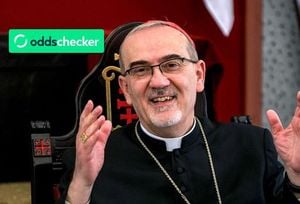SEOUL, May 8 (Yonhap) -- Democratic Party presidential candidate Lee Jae-myung is ramping up his campaign efforts to promote pro-business and economic policies as he prepares for the upcoming June 3 election. This push comes on the heels of a recent legal development that has eased some of the legal pressures he faces, following the postponement of his retrial over election law violations.
Lee attended a meeting with heads of major business lobbies in South Korea, including the Federation of Korean Industries and the Korea Chamber of Commerce and Industry, marking his first public engagement after the Seoul High Court delayed his retrial hearing by one month. The court postponed the hearing from May 15 to June 18, providing Lee with a temporary reprieve as he grapples with the potential overturning of a not-guilty verdict in a controversial land development case from his tenure as a provincial mayor. A finalized sentence in this retrial could bar him from running in the election.
With the hearing now postponed, Lee is shifting his campaign focus to business and the economy, a strategic move aimed at solidifying his growing influence in the election landscape. "The most important task ahead is to improve people's livelihoods, and reviving the economy is at the heart of this," Lee stated during the meeting. "And at the center of the economic recovery are businesses. If you present a path for growth and development, I will actively embrace it and work to turn it into better policies and put them into action," he added.
Lee's heightened emphasis on business is viewed as an effort to attract middle-of-the-road and conservative voters. Earlier in March, he met with Samsung Electronics Chairman Lee Jae-yong, followed by discussions with leaders of think tanks associated with South Korea's top four conglomerates: Samsung, Hyundai, SK, and LG. This marks a noticeable shift from his previous campaign approach, which placed less emphasis on business-related issues.
Later on May 8, Lee is scheduled to meet with approximately 500 officials from various workers' associations, including doctors, nurses, small business owners, and taxi drivers. This outreach aims to showcase his commitment to addressing the needs and concerns of diverse occupational groups. Additionally, Lee plans to appear on several YouTube business channels to further communicate his economic vision.
Yun Ho-jung, chief of Lee's campaign team, expressed confidence in the campaign's direction, stating, "Starting with the meeting with business lobbies, we plan to unveil our full visions for the economy and people's livelihoods." This proactive approach reflects Lee's recognition of the critical role that business circles play in achieving economic revitalization amidst growing trade uncertainties.
Lee's pivot towards a pro-business stance is particularly notable given the recent economic context. South Korea's economy contracted by 0.2 percent in the first quarter of 2025 compared to the previous quarter, underscoring the urgency of addressing economic challenges. Lee's strategy appears aimed at courting centrist voters, particularly moderate conservatives and swing voters who are increasingly concerned about economic growth, job stability, and market resilience.
During the meeting with business leaders at the Korea Chamber of Commerce and Industry headquarters, Lee emphasized the need for a paradigm shift in South Korean industries. He called for increased adoption of renewable energy and the nurturing of artificial intelligence technology as pivotal components of this transformation. "Business circles should play the central role in economic revitalization; gone are the days when the government spearheaded the economic and industrial agenda," Lee remarked, highlighting the importance of empowering the private sector.
He further stressed that if the government fails to trust the expertise and capabilities of private sector leaders, it will be challenging to navigate the current economic landscape successfully. Lee's remarks signal a break from the liberal bloc's traditional anti-business sentiment, indicating a new willingness to collaborate with the business community.
In response to suggestions from business representatives, Lee indicated that the time is ripe for South Korea's industries to adopt cutting-edge technologies, particularly in manufacturing. He hinted at revitalizing the renewable energy sector, which he argues has been neglected in favor of nuclear energy under the previous administration of ex-President Yoon Suk Yeol.
"Our reliance on coal-fired energy sources to run a business will greatly undermine the competitive edge of South Korean firms, considering the RE100 requirements. We need to foster the growth of the renewable energy industry," Lee asserted, emphasizing the need for a sustainable energy future.
Additionally, Lee addressed the contentious issue of raising the retirement age beyond the current limit of 60, stating that such a move would require public debate to avoid negatively impacting labor productivity. He also downplayed the possibility of further inheritance tax cuts from the recent revision set to take effect in 2028, which had been a concern raised by business circles.
As the June 3 election approaches, Lee's pro-business shift and engagement with the business community could significantly influence voter sentiment. His ability to navigate the complex intersection of economic policy, legal challenges, and public perception will be critical as he seeks to secure a path to victory in the upcoming presidential race.
Lee Jae-myung's evolving stance on business and economic policy not only reflects his strategic campaign adjustments but also signals a broader shift in South Korean political discourse, where collaboration with the private sector may become increasingly essential for achieving economic stability and growth.




